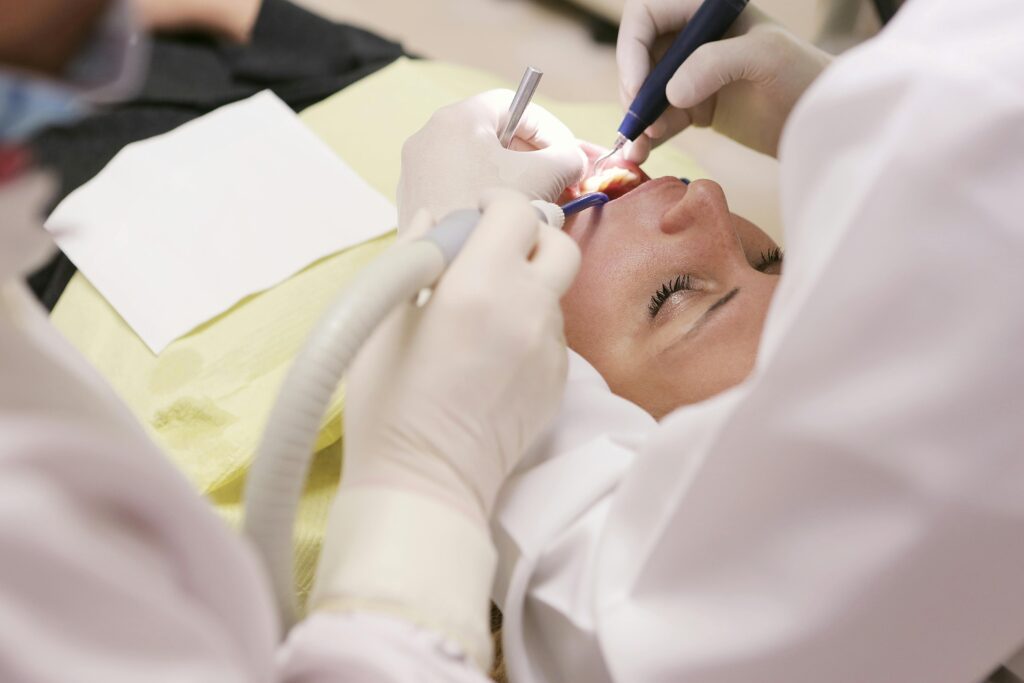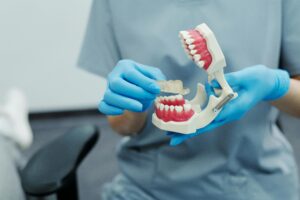Getting a dental implant in Aberdeen is a major decision—one that affects your smile, confidence, and long-term oral health. While implants offer one of the best solutions for missing teeth, they’re also complex procedures that require proper planning and the right provider.
If you’re considering this treatment, here are the top 7 questions you should ask your dentist before moving forward. These will help you make an informed choice, avoid unexpected costs, and ensure the best possible outcome.
1. How Many Dental Implants Have You Performed?
Experience matters. While dental implants are generally safe and predictable, the success of the procedure depends heavily on the skill and experience of the dentist.
Why this question matters:
- Dentists who place implants regularly are more likely to foresee complications and make adjustments during surgery.
- Experienced providers often use advanced imaging and surgical guides for precision.
- A dentist with a strong portfolio will have photos, testimonials, or even videos of past cases.
What to look for:
- At least several dozen successful implant cases per year
- Positive patient reviews or before-and-after images
- Confidence in answering your questions during the consultation
Some Aberdeen practices, like Andrew Scott Dental Care and Dental Implant Centre Scotland, highlight extensive experience with over 1,000 cases and consistent success.
2. What Type of Implant System Do You Use and Why?
There are many implant systems available, each with different materials, designs, and long-term outcomes. Ask your dentist which system they use and why they trust it.
Popular high-quality brands include:
- Straumann
- Nobel Biocare
- BioHorizons
- Astra Tech
These brands are known for rigorous clinical research, biocompatible materials, and long-lasting performance. Some practices offer more budget-friendly options, but make sure those are backed by strong success data.
Why this matters:
- Cheaper or generic systems may be less predictable over time
- A reputable system ensures better integration, crown fit, and long-term stability
- Availability of replacement parts is easier if future work is needed
3. Do I Have Enough Bone for a Dental Implant?
A common issue in implant dentistry is insufficient bone in the jaw. This can happen after long-term tooth loss, periodontal disease, or trauma. If your bone volume is too low, the implant won’t have the support it needs to stay in place.
How this is checked:
- Your dentist will take a 3D CBCT scan to evaluate bone height, width, and density
- They’ll examine sinus proximity and nerve placement, especially in the upper or lower back jaw
What if bone is lacking?
- A bone graft may be needed to add support
- Sinus lifts are sometimes performed for upper implants near the sinus cavity
Some clinics in Aberdeen include bone grafting in their implant packages, while others charge extra—so be sure to ask.
4. What Will the Entire Process Involve—Start to Finish?
Dental implant treatment is not a single appointment. It’s a multi-phase journey that includes consultation, surgery, healing, crown fitting, and follow-ups. Knowing each step in advance helps you plan your schedule and budget.
Typical steps:
- Initial consultation with 3D imaging
- Surgical placement of the implant
- Healing phase (osseointegration) of 8–12 weeks
- Abutment and crown placement
- Post-procedure check-ups
Ask about:
- Timeframes between appointments
- What happens if healing takes longer than expected
- Will you be without a tooth during healing—or will you get a temporary crown or denture?
Getting a clear treatment timeline ensures you’re not left in the dark mid-process.
5. What Will the Dental Implant Cost—And What’s Included?
Implants can vary significantly in price depending on the clinic, materials used, and any additional procedures needed. Aberdeen clinics offer a range of options, starting around £1,495 for a single implant.
But what’s included in that cost?
You should ask whether the price includes:
- CBCT scans and imaging
- Surgical placement of the implant
- Healing abutment and final crown
- Temporary crown (if needed)
- Post-op care and checkups
- Bone grafting or sedation if necessary
Some clinics offer “all-in-one” pricing, while others charge separately for each phase. Make sure you get a written breakdown of the total cost to avoid surprises.
Also ask if the clinic offers:
- 0% interest monthly payment plans
- Deposit options to reserve appointments
- NHS coverage or private-only options
6. What Are the Risks and Success Rates of Dental Implants?
While dental implants boast a success rate of 95% or higher in healthy patients, they’re not risk-free. Knowing what could go wrong and how complications are managed is part of making a well-informed choice.
Possible risks:
- Infection around the implant
- Failed osseointegration (implant doesn’t fuse with bone)
- Nerve damage or sinus complications
- Gum inflammation (peri-implantitis)
What to ask your dentist:
- What is your personal success rate with implants?
- How often have you had to remove a failed implant?
- What’s your protocol if an implant doesn’t integrate?
- Will I be charged again for corrective work?
The answers to these questions will tell you how confident the clinic is in their procedure—and how they treat their patients when things don’t go as planned.
7. What Kind of Aftercare and Maintenance Is Required?
After the crown is fitted, your implant isn’t a “set it and forget it” solution. It needs ongoing care to remain healthy and functional for the long term.
Maintenance includes:
- Brushing twice daily with a soft brush
- Flossing or using interdental brushes
- Avoiding smoking and hard biting surfaces
- Regular dental check-ups every 6 months
Ask if your clinic provides:
- Post-op care guides or kits
- Free follow-up appointments
- Hygienist support for cleaning around the implant
Also, ask what happens if the crown chips or needs replacing in 10–15 years. Understanding future maintenance and costs helps you plan ahead.
Bonus Tip: Ask to See Case Studies or Talk to Previous Patients
Nothing builds confidence like seeing real-life results. Ask your dentist for case studies of patients who’ve had similar treatments. If they have permission, they might also let you contact a past patient to hear their experience.
Look for:
- Photos before and after treatment
- Testimonials about comfort, healing time, and support
- Results with similar age, jaw condition, or number of implants
Aberdeen clinics often showcase real patient results on their websites or in-office galleries. Seeing these can help set realistic expectations and boost your trust in the provider.
Why Asking Questions Leads to Better Implant Outcomes
The best dental clinics in Aberdeen welcome questions. They want you to feel informed, empowered, and comfortable before proceeding. Rushing into dental implants without full clarity can lead to regret, extra costs, or disappointment.
By asking these key questions, you:
- Reduce your risk of complications
- Understand your treatment timeline and finances
- Choose a provider that matches your expectations
- Increase your chances of a long-lasting, healthy result
Conclusion
Getting a dental implant in Aberdeen can transform your oral health and confidence. But it’s not just about replacing a missing tooth—it’s about doing it the right way.
The 7 questions covered here give you the knowledge you need to make a confident decision:
- How experienced is your provider?
- What implant system do they use?
- Do you have enough bone—or need a graft?
- What’s the full process like?
- What’s included in the price?
- What risks are involved?
- What aftercare will be needed?
Take the time to research, compare providers, and ask these questions during your consultation. A reputable clinic will welcome them and answer with honesty, clarity, and transparency.
When you make your choice based on information—not pressure—you’ll enjoy the full benefits that dental implants can offer.




